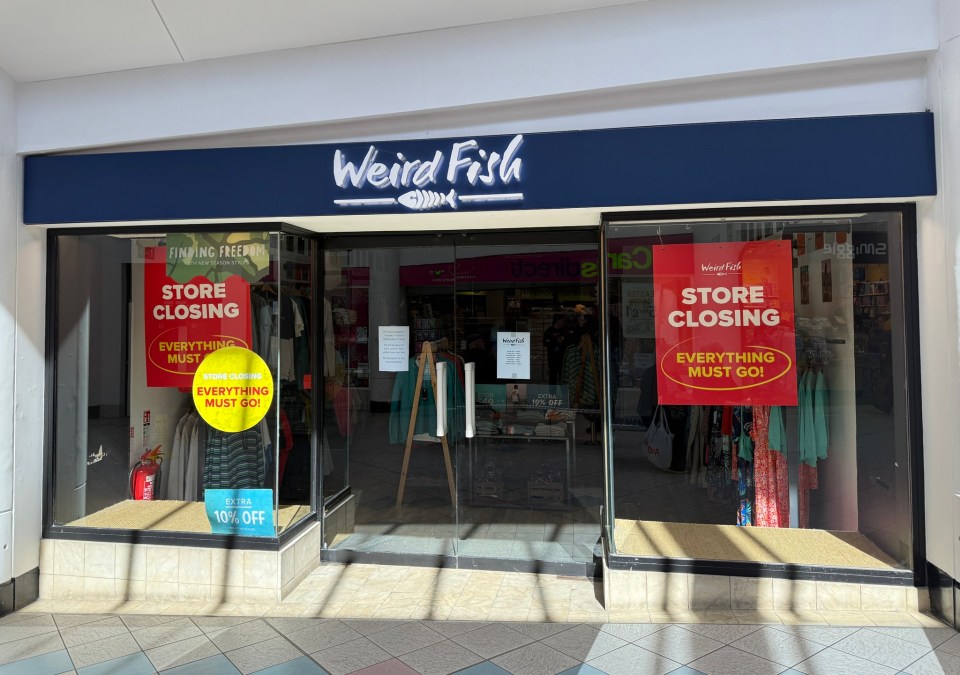A HIGH street retailer with more than 30 shops has suddenly closed one of its stores.
Clothing brand Weird Fish has shut its location in Horsham, West Sussex, for good in a move that customers have called “a shame”.
A local Facebook group said earlier this week the store was about to close and wished the staff good luck.
They posted a photo of the store with ‘everything must go’ signs placed in the windows.
One commenter said: “What a shame, have had a few nice bits from there.”
Another said they had loved the clothes, while a third person said its products were “nice quality”.
However some locals said the shop had put customers off as it was too pricy.
“No surprise there. Too expensive for the average person,” one person said.
Another added: “No one can afford to buy new clothes let alone over priced clothes!! Shame but it’s true.”
It’s not clear exactly when the shop shut for good, but it’s now listed on Google as “permanently closed”.
The Horsham branch has also been taken off the list of store locations on the Weird Fish website.
The Sun has approached Weird Fish for comment.
Locals say the store is set to be replaced by Hotter Shoes, which has dozens of shops across the UK.
One commenter on Facebook said: “Can’t wait! Lovely and very comfortable shoes!”
Another said: “Fantastic news. I love hotter shoes.”
Weird Fish now has 33 stores across the UK, including in Whitstable, Braintree, Newquay and Weymouth.
The chain shut its York branch last month after “everything must go” sale signs were put up in the windows.
Another branch in Canterbury, Kent, was shut last year following a commercial decision.
A spokesperson from Weird Fish said at the time: “The landlord is redeveloping this unit and the adjacent one, which meant they needed the space back which didn’t work for us commercially.”
It’s worth bearing in bind that retailers often close branches for a number of reason and it doesn’t necessarily mean the chain is struggling.
For example, it could be if a lease has come to an end or that particular location has low sales.
Weird Fish announced at the end of 2023 that it would open 10 new stores in 2024.
High street struggles
A number of high street chains do appear to be struggling financially and have closed locations.
New Look confirmed yesterday it was shutting its Bexleyheath store for good, as it plans to axe nearly 100 locations.
The fashion retailer has struggled with tax changes announced in the Autumn budget.
Meanwhile charity shop Scope recently shut 39 stores, with all closing on March 31.
Why are retailers closing shops?
EMPTY shops have become an eyesore on many British high streets and are often symbolic of a town centre’s decline.
The Sun’s business editor Ashley Armstrong explains why so many retailers are shutting their doors.
In many cases, retailers are shutting stores because they are no longer the money-makers they once were because of the rise of online shopping.
Falling store sales and rising staff costs have made it even more expensive for shops to stay open.
The British Retail Consortium has predicted that the Treasury’s hike to employer NICs from April 2025, will cost the retail sector £2.3billion.
At the same time, the minimum wage will rise to £12.21 an hour from April, and the minimum wage for people aged 18-20 will rise to £10 an hour, an increase of £1.40.
In some cases, retailers are shutting a store and reopening a new shop at the other end of a high street to reflect how a town has changed.
The problem is that when a big shop closes, footfall falls across the local high street, which puts more shops at risk of closing.
Retail parks are increasingly popular with shoppers, who want to be able to get easy, free parking at a time when local councils have hiked parking charges in towns.
Many retailers including Next and Marks & Spencer have been shutting stores on the high street and taking bigger stores in better-performing retail parks instead.
In some cases, stores have been shut when a retailer goes bust, as in the case of Carpetright, Debenhams, Dorothy Perkins, Paperchase, Ted Baker, The Body Shop, Topshop and Wilko to name a few.
What’s increasingly common is when a chain goes bust a rival retailer or private equity firm snaps up the intellectual property rights so they can own the brand and sell it online.
They may go on to open a handful of stores if there is customer demand, but there are rarely ever as many stores or in the same places.
The Centre for Retail Research (CRR) has warned that around 17,350 retail sites are expected to shut down this year.













